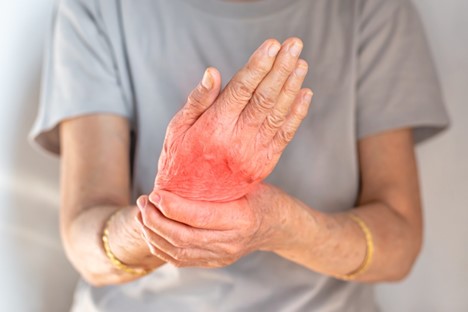Rheumatoid arthritis is a persistent illness that majorly affects life quality. Catching the signs early ensures timely action, crucial for managing rheumatoid arthritis disease. Initially, symptoms may be subtle, with occasional joint pain or morning stiffness. However, understanding these early hints can pave the way for effective treatment and improved life quality. Early intervention is essential because it can prevent severe joint damage and limit the progression of rheumatoid arthritis. This article aims to shed light on how recognizing symptoms sooner rather than later can make a significant difference.
Understanding RA as an Autoimmune Condition that Targets Joints
Rheumatoid arthritis stands out from other joint-related conditions due to its unique characteristics. It’s an autoimmune disease, meaning the body’s immune system mistakenly attacks its own joints. Unlike other types of arthritis, rheumatoid arthritis often damages joints on both sides of the body equally, such as both hands or both knees, which is a distinctive feature. This symmetry in joint issues can help doctors differentiate it from other types of arthritis. Recognizing this pattern is vital, as the earlier rheumatoid arthritis disease is identified, the better it can be managed.
Recognizing the Symptoms Early On
Spotting symptoms early can significantly influence the management of rheumatoid arthritis disease. Common signs to watch for include:
- Joint pain: This pain often starts in the smaller joints of your hands and feet, but can spread.
- Stiffness: Stiffness is most common after periods of rest, such as in the morning or after long sitting sessions.
- Swelling: The affected joints may appear swollen and feel warm.
Beyond joint issues, other symptoms can arise:
- Fatigue: Tiredness can come and go, often leaving those affected feeling drained.
- Fever: A mild fever might accompany bouts of flare-ups.
- Weight loss: Unintentional weight loss is possible due to a decrease in appetite.
Being aware of these signs ensures that rheumatoid arthritis is caught early, allowing for treatments to be more effective. The awareness of rheumatoid arthritis symptoms also helps in avoiding misdiagnosis or delaying necessary interventions.
Progression and Flare Patterns
Rheumatoid arthritis often progresses in waves, known as flare-ups or flares. These are periods where symptoms worsen noticeably. During these times, one might experience heightened joint pain, swelling, and fatigue. Some individuals may experience mild flares, while others might face severe symptoms leading to noticeable joint damage if unmanaged. Understanding these patterns helps in preparing for and managing flares, reducing their impact on daily life, and maintaining a semblance of normalcy.
Decoding the Causes and Risk Factors
The causes of rheumatoid arthritis aren’t completely understood, but there are factors that may increase risk:
- Genetic influence: A family history of the condition can heighten chances.
- Environmental elements: Factors like smoking and exposure to certain substances can play roles.
- Hormonal linkages: Women are more likely to develop rheumatoid arthritis, suggesting hormones may be involved.
Understanding these factors empowers individuals to make lifestyle choices that could potentially decrease their risk of developing rheumatoid arthritis disease.
Accurate Diagnosis: Key to Management
Diagnosing rheumatoid arthritis promptly and accurately is crucial. The journey to diagnosis often involves:
- Blood tests: Markers of inflammation and antibodies specific to rheumatoid arthritis can be detected.
- Imaging methods: X-rays or MRIs can reveal joint damage that isn’t visible yet.
These tests help doctors formulate a precise treatment strategy, tailored to manage each person’s specific symptoms.
Empowering Treatment Options for RA
When dealing with rheumatoid arthritis, exploring treatment options is essential. Here’s how various approaches can help:
- Medications:
- DMARDs (Disease-Modifying Anti-Rheumatic Drugs): These slow down the disease’s progression.
- Biologics: Target the specific parts of the immune system involved in inflammation.
- NSAIDs (Nonsteroidal Anti-Inflammatory Drugs): Help alleviate pain and reduce swelling.
- Non-drug treatments:
- Physical therapies: These can improve joint function and reduce pain through guided exercises.
- Nutritional guidance: Eating a balanced diet can help manage symptoms and improve health.
- Surgery:
- When medication and other treatments fail, surgery can be considered to repair or replace damaged joints.
Appropriately combining these treatments can significantly ease symptoms and enhance life quality for those living with rheumatoid arthritis disease.
Lifestyle Adjustments and Home Remedies
Beyond medical treatments, lifestyle plays a pivotal role in managing rheumatoid arthritis:
- Exercise & Protection: Gentle exercises like swimming or walking are beneficial. Protecting joints with appropriate techniques reduces stress and injuries.
- Energy Management: Understanding personal limits can help conserve energy and reduce fatigue.
- Stress Relief at Home: Engage in calming activities such as reading, meditation, or hobbies that bring joy and relaxation.
These simple steps can be integrated into daily routines, offering a manageable approach to dealing with rheumatoid arthritis disease.
Thriving with Rheumatoid Arthritis: Daily Tips
Living well with rheumatoid arthritis is achievable with a few daily adjustments:
- Assistive Devices: Using gadgets like jar openers or raised toilet seats can ease tasks.
- Adapting Tasks: Simplifying or breaking down duties into smaller steps lessens strain on the joints.
- Emotional Wellness: Talking to loved ones or joining support groups can boost mental well-being and provide community support.
By focusing on these aspects, individuals can navigate life with rheumatoid arthritis more smoothly and positively.
When to Consult a Specialist
Knowing when to seek specialist help can prevent potential complications:
- Warning Signs: Increased pain, severe swelling, or difficulty performing daily tasks necessitate medical advice.
- Routine Health Visits: Regular check-ups ensure optimal management and address any arising concerns promptly.
Regular specialist consultations can help fine-tune treatment plans, ensuring rheumatoid arthritis disease doesn’t compromise quality of life.
Understanding and acting on the symptoms and treatment options of rheumatoid arthritis can lead to a better quality of life. Recognizing signs early, understanding progression, and knowing when to seek help are key steps. Armed with the right knowledge, those living with rheumatoid arthritis disease can effectively manage symptoms and embrace life’s possibilities.
Contact Apex Hospitals for expert care and personalized treatment plans to manage rheumatoid arthritis. Take control of your health and live life to the fullest!

